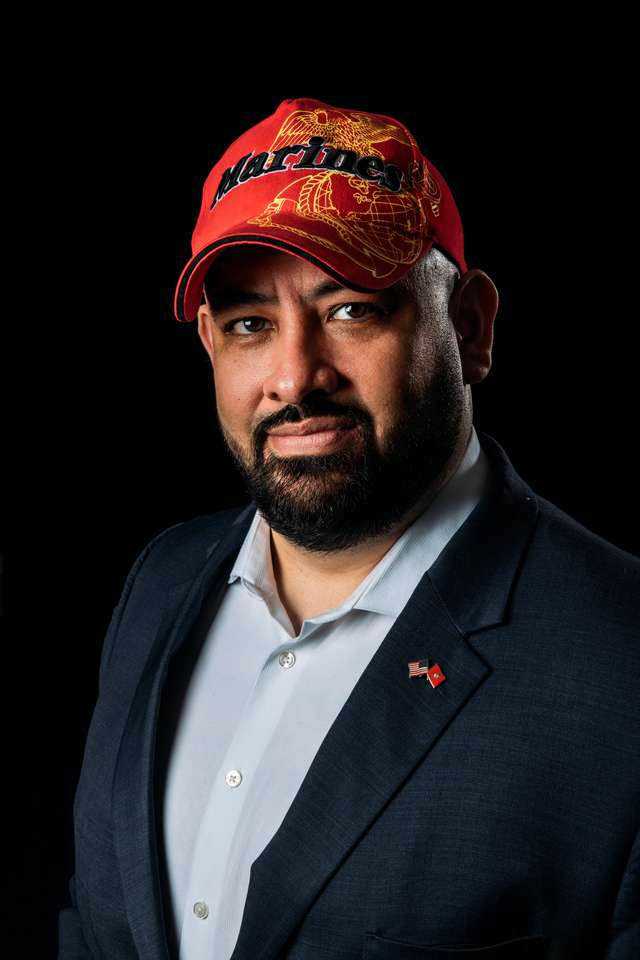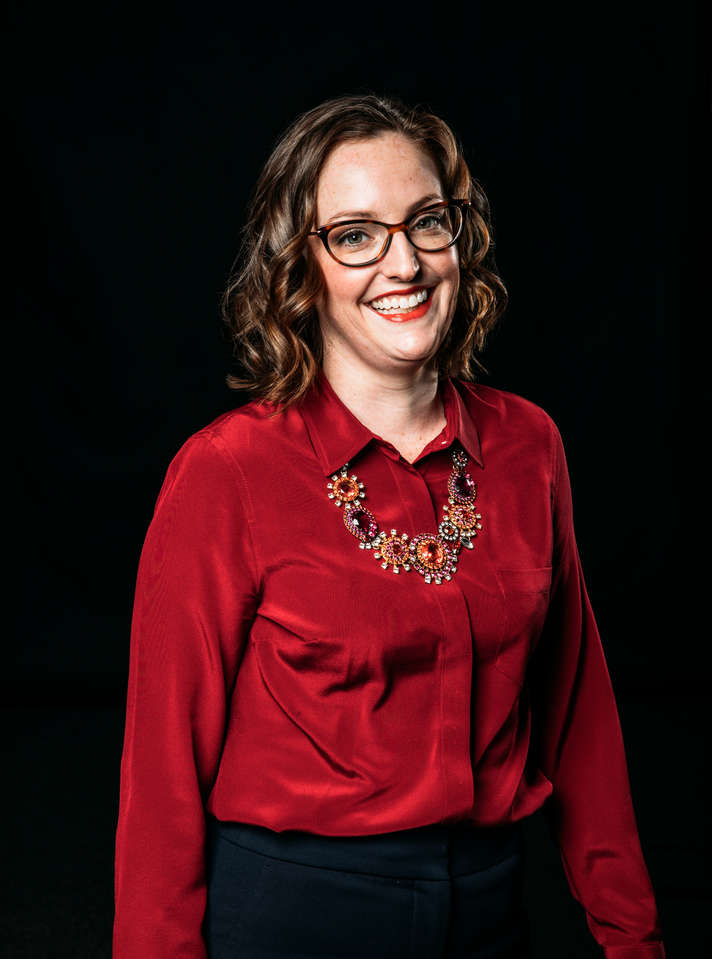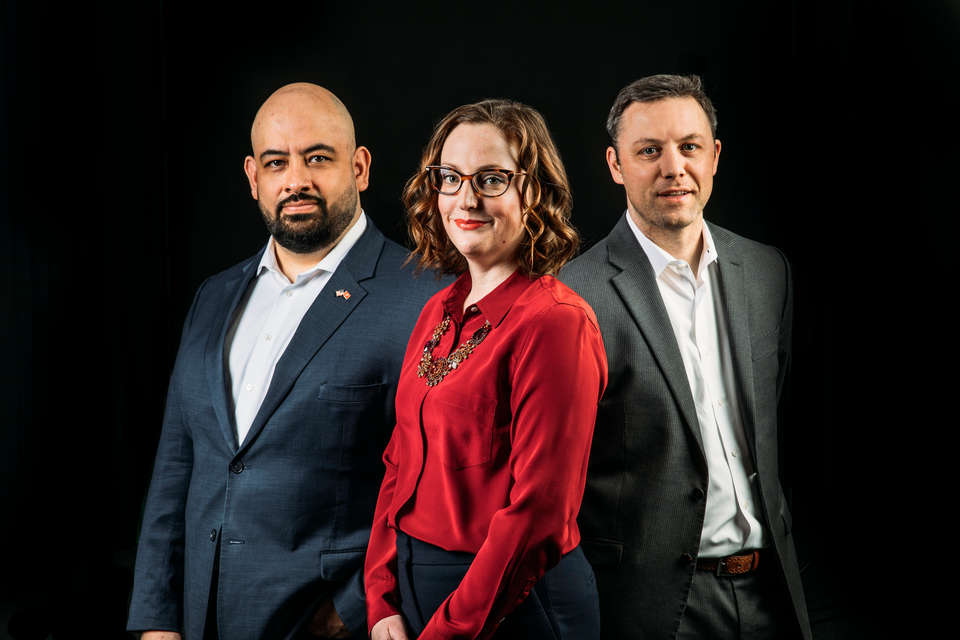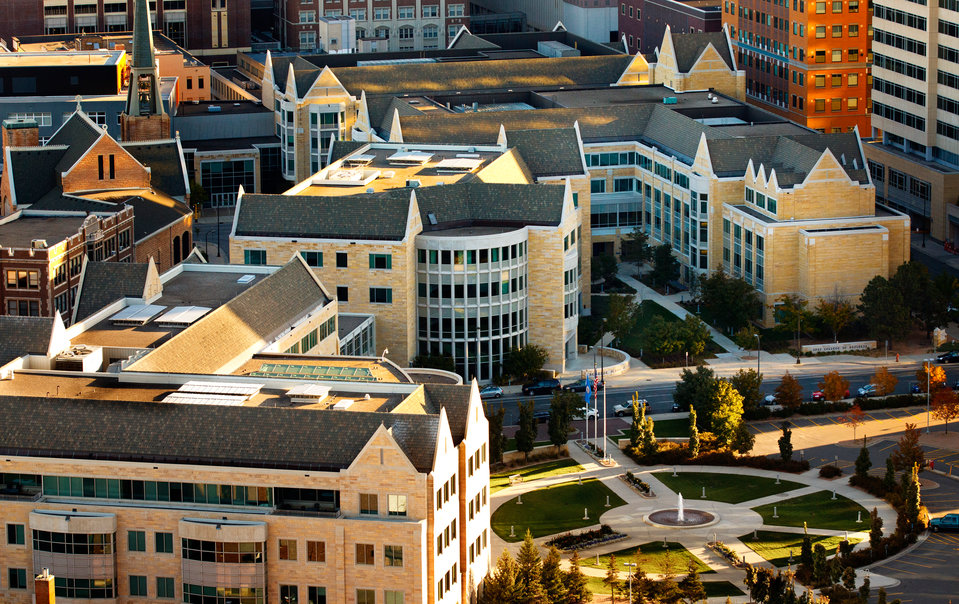Sitting at a folding table in the atrium balcony of the Minneapolis Veterans Administration Medical Center, Eddie Ocampo ’18 J.D. counsels a veteran about employment issues relating to a military service-connected disability. Nearby, other volunteer attorneys with the Minnesota Assistance Council for Veterans (MACV) Vetlaw program meet with clients about housing, real estate, criminal expungement, debt collection, estate planning, and family law matters. An oversized American flag hangs overhead, and veterans visiting for health care appointments enter and exit the building below. The air is filled with conversation and foot traffic and patriotism.
Since 1990, MACV has provided nonprofit services to Minnesota veterans who are homeless or at risk of homelessness, including transitional housing, employment assistance, rental assistance and legal assistance. The Vetlaw program gives at-risk veterans access to justice through legal information, referrals and legal advice on most legal topics. Vetlaw clinics are held multiple times each month at locations across the state, and are primarily staffed by volunteers.

St. Thomas School of Law alum Eddie Ocampos, a veteran of the Marines.
“As a statewide program with only two attorneys,” said Sara Sommarstrom, Vetlaw’s director, “the success of Vetlaw clinics depends on the generosity of volunteer attorneys, legal professionals and law students to help the legal needs of at-risk Minnesota veterans.”
Sommarstrom, who has worked with the veteran population for a decade, observed, “The prevailing wisdom says it is difficult for veterans to ask for help. I think part of the reason for that is the public view of our service members as one of two extremes – superheroes or broken – combined with their military training that often encourages them to take care of matters themselves rather than reach out when they need assistance. The veterans I have met and worked with over the years are as diverse as civilian society, with most living between those extremes.”
For University of St. Thomas School of Law alumni who volunteer with the Vetlaw program, clinics are an important way of serving those who served. Their connection to the veteran community is often personal. Our alumni Vetlaw volunteers include veterans, those who wanted to serve but were denied, friends and family of veterans, and those who admire veterans. These accomplished attorneys are living the law school’s mission by serving veterans in need. As Ocampo put it, “[Veterans are] a population that at some point early in their life signed a blank check made payable to the United States of America for an amount up to, and including, their life. It is now on us to show them our appreciation and gratitude for their service.”
Veterans serving veterans
After five years in the Marine Corps and deploying to Afghanistan, Ocampo spent the next decade as a civilian struggling to process his deployment experience. He met countless veterans with the same challenges, many of whom had legal problems that were compounded by mental health issues. In 2015, Ocampo entered law school to get involved with veterans’ advocacy. Through a law school mentor, he discovered the Vetlaw program.
For Ocampo, who is now an employment litigator at Fredrikson & Byron in Minneapolis, the most rewarding part of Vetlaw clinics is connecting with and relating to the clients. “Generally, I approach most communications using military jargon, inter-service banter, and through the unique ingrained military sense of humor we share – not an approach I can take with most clients in my practice,” Ocampo said. “This approach is very much appreciated in diffusing what is almost always a difficult conversation. Over the years, I have learned that being able to relate to a veteran is incredibly powerful, especially during a time when they find it difficult to trust someone or to open up and seek help.”
Charles Nelson ’11 J.D., a financial restructuring and bankruptcy attorney at Ballard Spahr in Minneapolis, served 10 years in the Air Force. Nelson credits his military service for his professional success: “My training and work experience in the military are the foundation of where I am now – I wouldn’t be a lawyer without it.” Similar to Ocampo, Nelson starts his Vetlaw clinic intake conversations “focused on learning about the veteran and their military services. I’m always humbled to learn about the sacrifices others have made for me, my family and friends, and our community and country. That’s the most rewarding part – connecting on a personal level with our veterans about their experiences in the military.” Though Nelson left the military years ago, he continues to have a strong desire to serve others. “I can think of no better group of people to offer pro bono services to than our veterans.”
David Best ’14 J.D., a family law attorney with Bushnell & Best in Shoreview, Minnesota, also served in the Air Force. He noted that military experiences are not all the same – different service branches, varying years of service, distinct missions. Best has nevertheless experienced a strong connection with his Vetlaw clients through their shared service background, which tends to give way to an honest dialogue about difficult issues. Best noted that people have a choice in their pro bono service, and he encourages people to “have a system for giving back regularly to a cause they believe in.” For him, working with veterans “just feels like the right thing to do.”
‘There are a lot of ways to serve your country’

St. Thomas School of Law alum Jill Sauber.
Jon Wolf ’11 J.D. a litigator at Rinke Noonan in St. Cloud, Minnesota, wanted to join the military and got as far as his Military Entrance Processing Station before being medically disqualified. Wolf was disappointed but took seriously a message from his military science instructor, who said, “There are a lot of ways to serve your country and being in the military is just one of them. Keep your eyes open and you’ll find others.” For Wolf, volunteering for the Vetlaw program is a way to “give back to our country as well as individually to people who have sacrificed on behalf of the rest of us.” The most rewarding part is “being included in the veterans’ community in even a small way. Despite having extremely diverse backgrounds, political opinions and socio-economic positions, veterans have many shared goals and are extremely accepting of anyone who is willing to help out a member of their community.” Wolf experiences this culture of gratitude every time he goes to the VA for a pro bono legal advice clinic, he said, when Nick Ingman, an Army veteran and VA employee, brings him a soda and says, “Thanks for your volunteer work helping veterans.”
Jill Sauber ’13 J.D., who practices estate and elder law at Sauber Legal Services in Minneapolis, regularly advises veterans – both in her private practice and through the Vetlaw program. Sauber has family members and mentors who served in Vietnam, and “feel[s] strongly about giving back to those veterans who were drafted, served, and were lucky enough to return to the States – unappreciated when they returned home from war.” Sauber started volunteering with the Vetlaw program when she was in law school, helping with intake and forms. “It was the perfect way to help veterans in an immediate way.”
She, too, emphasized the relationships she builds with Vetlaw clients and how appreciative they are for the help. “The Vetlaw program gives you instant feedback – the veterans are extremely appreciative for anything you can assist them with, and they leave the legal clinic with more answers than they came with. I love hearing the stories from veterans and getting to know them as we walk through their legal issues during the clinics.”
“The law school seeks to foster in its students a commitment to serving those in need,” Dean Robert Vischer said. “Our alumni who volunteer for the Vetlaw program are giving back to men and women who have given so much to our country. We could not be prouder of their contributions to this program.”





